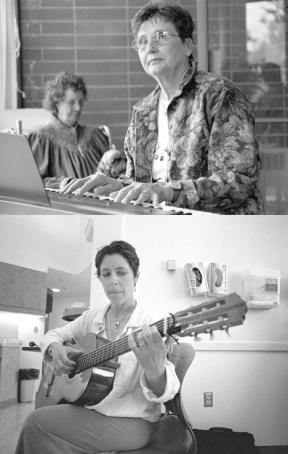Marion Mullkoff has long been used to hearing her husband, Eugene, play the piano in the couple’s Coupeville home.
An Alzheimer’s patient at Whidbey General Hospital, that music is one of the things she remembers best. Sitting in a wheelchair in the hospital’s solarium this week, that music came back to her. But it wasn’t Eugene Mullkoff doing the playing; he was standing out in the hall.
At the keyboard was Rosemary Brown, a volunteer in the hospital’s live music program. At the hospital for one of her twice-a-week appearances, Brown was playing something soothing but not readily identifiable.
Mullkoff didn’t care that there was no sheet music above the keyboard, or that Brown stopped occasionally to talk to other people in the solarium. She was just happy to listen to something more pleasant that the television in her room or the noise in a hospital hallway.
“It’s very lovely,” Mullkoff said as she held her Yorkshire terrier Tilly loosely in her lap.
Though she was only able to listen to the music for a few minutes before tiring and being taken back to her room, Mullkoff, like many other patients at the hospital, discovered the healing power of music in the solarium.
An adjunct to Whidbey General’s recently established music therapy program, live music at the hospital has become a regular and popular non-traditional treatment. Every week, several volunteer musicians play guitar, keyboard and other instruments in the hospital’s cancer treatment center, in ward hallways and even individual rooms to take their minds off illness and pain.
According to hospital music therapist Barbara Dunn, music works as well or better than a drug in many cases. As a therapy, it can manage pain, help patients relax, help suppress nausea and be part of physical therapy. Played live for patients, it is a relaxing distraction that can make being at the hospital seem almost pleasant, she said.
At the hospital since last summer, Dunn, a Clinton resident, is careful to make the distinction between music therapy and the live music program. Music therapy, she said, gets patients involved in making music, especially patients who need to work on motor skills. The therapy can involve playing an instrument, writing music or even stringing a guitar.
The live music — which got started last fall — can boost the general attitude of patients and put the minds on something other than being sick. Whidbey General, Dunn said, is one of a very few hospitals in Washington using music to augment training.
“We’re cutting edge here at the hospital,” she said.
Renee Yanke, a nurse who runs the hospital’s cancer treatment unit, said this week that she sees music working almost as a drug regularly. She said a patient who recently came to the unit for her first chemotherapy treatment actually had a pleasant time simply because there was music playing on a nearby stereo.
“People really relax,” she said. “It decreases their stress level.”
Dunn, who has practiced music therapy since 1982, said she is trying to build the live music program, as well as the music therapy program. She is trying to get more musicians to play in the hospital, is collected CDs and cassette tapes for a music library for patients, and is planning to start an internship program for music therapists.
If she had more musicians talk to keyboardists Marion Brown, that growth might happen through catching enthusiasm. Brown plays both at the hospital and at Careage nursing home in Coupeville. She got her start in helping patients with music by playing for her late daughter, who died of cancer in 2000. The music soothed her pain as she succumbed to the disease, Brown said. But she also believes music can help others recover from illness.
Letting her “fingers lead her,” Brown plays music to fit the situation. Oftentimes, she simply puts together pleasant chords for relaxation. Other times, as with two boisterous men at Careage, she plays for a singalong.
“So many of the patients enjoy it,” she said.
According to Dunn and Judy Moore, the Whidbey General administrator who started the music therapy program, live music and music therapy are inexpensive methods by which to treat patients who need soothing and relief. Moore said the hospital does not hand has no plans to bill patients for either program; grants and donations currently pay for Dunn’s position, supplies needed for music therapy, and for a number of small CD players that patients can borrow to listen to their own music.
“It’s been kind of a labor of love,” Moore said.



